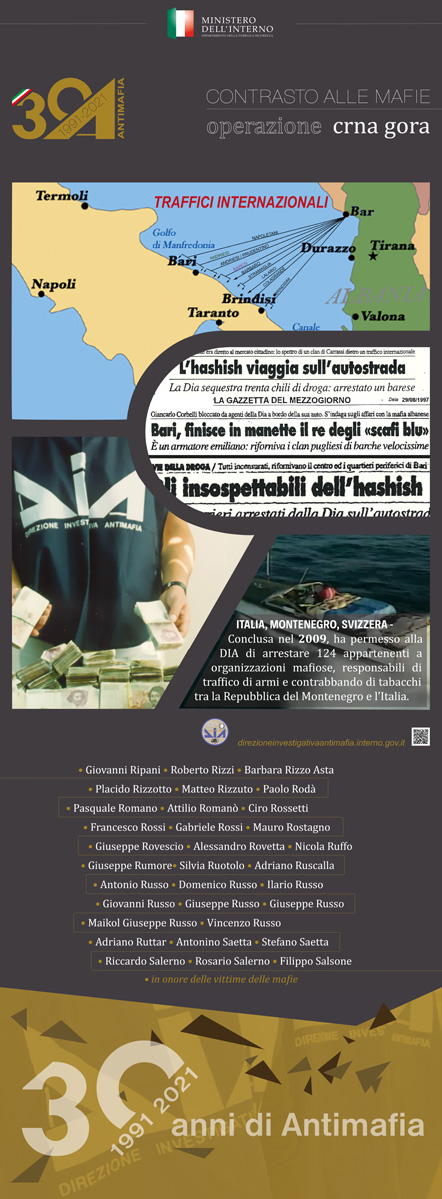

OPERATION “CRNA GORA”
Operation “Crna Gora”[1], carried out by the Operational Centre in Bari from 1996 to 2009, started out as a wide-ranging criminal police investigation. It was later divided into five sub-branches which mostly investigated arms trafficking and tobacco smuggling between Montenegro and Italy.
These illegal activities were carried out by Mafia-type organizations from Apulia and Naples with the support of a large group of dangerous fugitives living in Montenegro. The investigation also identified the channels used to launder the proceeds of crime and revealed the existence of organizations which were handling the transfer of huge sums of money from Italy to Switzerland and that there was connivance between organized crime and representatives of Montenegrin institutions.
In this context 124 members of a Camorra-type criminal organization in which they played different roles were arrested (103 in execution of preventive custody orders and 16 in flagrante delicto). The most prominent among the arrestees were: Vaso BAOSIC, Chief of Police of Bar, Montenegro; Franco VERDA, President of Canton Ticino’s Criminal Court; Gerardo CUOMO, historic boss of the illegal tobacco trade; Giancarlo CORBELLI, a leading shipbuilder for smugglers; Francesco MORETTI, a Swiss lawyer and mastermind of a criminal organization engaged in money laundering between Italy and Canton Ticino.
Five prominent fugitives were also arrested, including Benedetto STANO, undisputed key figure in the criminal organization called Sacra Corona Unita, wanted on an international arrest warrant for mass murder, Mafia-type association and other offences.
During the investigations assets worth over €16 million, consisting mainly of cash or deposits in bank accounts, were seized from the clans.
The complex and well-organized operation led in particular to:
- the identification of international brokers of Italian, Swiss and Spanish nationality but operating directly in Switzerland who purchased massive quantities of foreign manufactured tobacco products on international markets and subsequently imported them to Montenegro;
- the identification of Italian citizens in Montenegro, including several fugitives, who acted as liaison with Italian criminal organizations for the purchase of foreign manufactured tobacco products;
- the determination of tangible interests of top-level organized crime members and their tendency to obtain cigarettes through new supply channels rather than through the usual sea routes;
- the discovery that government officials and law enforcement representatives of Montenegro were deeply involved in covering up smuggling activities of foreign manufactured tobacco products;
- the location of warehouses used by a state-owned company to store foreign manufactured tobacco products in Montenegro;
- the identification of the channels used to launder the proceeds of trafficking and of the people involved in this activity, including serious criminals, one of whom had already been tried as a result of the well-known “Pizza Connection” Operation;
the arrest of several money couriers who were found in possession of large amounts of money derived from smuggling that was destined for Switzerland to be laundered.
[1] The Socialist Republic of Montenegro, in Montenegrin: Socijalistička Republika Crna Gora



